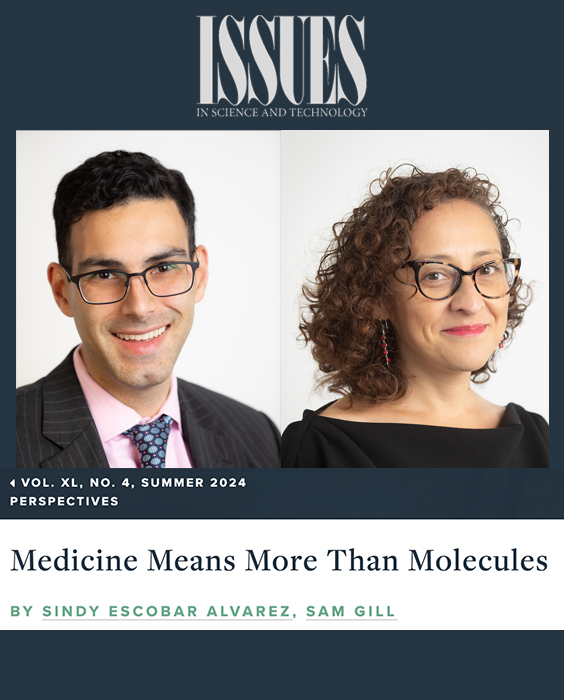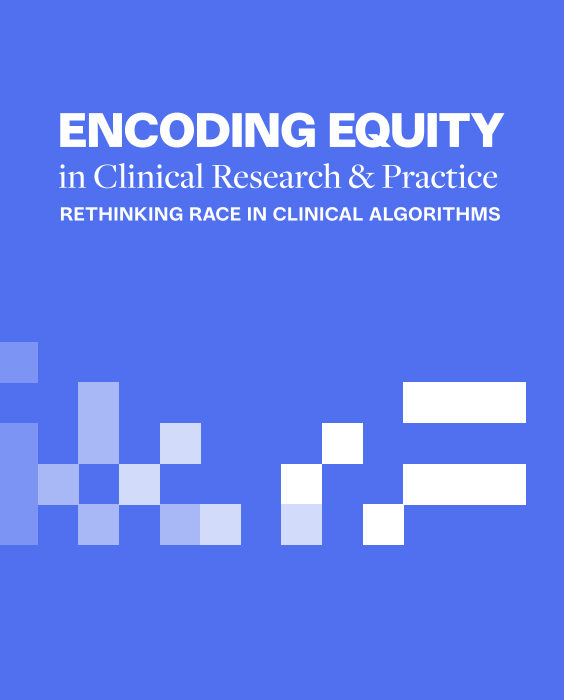Purpose
Racial Equity in Clinical Equations advances health equity by interrogating the use – and misuse – of race in the design of clinical algorithms currently guiding medical care. It is the first national coordinated effort to focus on research and on providing the evidence necessary to move the field beyond the use of tools that are known to be inconsistent in their use of race as a factor. Enlisting medical specialty organizations, hospital groups, funders and others who can inform the transformation of medical thinking, Racial Equity in Clinical Equations seeks to accelerate the creation of uniform evidence-based guidelines for the use of race information in research related to the design and use of clinical decision-making tools.
Rationale & History
For decades, mathematical models known as algorithms have helped inform decisions about medical diagnosis and treatment options. Incorporated into clinical guidelines, clinical decision tools and systems used by hospitals, health systems and payers, these algorithms take into account a variety of factors, including patient symptoms, medical history, test results and race. Clinical algorithms or their outputs are used and interpreted by doctors to guide recommendations such as whether to test a child for pediatric urinary tract infection, or to diagnose kidney or lung disease.
Despite their wide use, such algorithms do not equally benefit all patients. Some medical algorithms have been developed without a sufficiently critical, research-based approach to the use of information about race. Others have been built on flawed assumptions or developed from homogenous data sets that do not reflect the patient population at large. These gaps in research and guidelines may result in undue harm, most often to communities that have experienced systemic inequities. They can also perpetuate existing disparities in care.
A growing number of voices, including leading clinicians, legislators and federal agencies, have called for a re-examination of clinical algorithms, arguing that they must be validated through rigorous research that ensures equitable healthcare services and outcomes. Some have already begun the necessary work to redress these gaps to confirm that the use of algorithmic tools leads to the best course of care for every patient.
To accelerate and grow these efforts, the Doris Duke Foundation has committed to strategic investments that include funding research in areas with the potential to accelerate progress, convening those in a position to evolve thinking around medical algorithms and communicating evidence-based research to energize action across sectors. Our goal is to foster a larger, coordinated and visible movement that supports greater transparency in the use of these tools, a more active and ongoing discussion about how and when these tools are used and evidence-based guidance in the research community’s consideration of race in the design of clinical algorithms.
To that end, the foundation has awarded new grants to the five organizations listed below. To read the project descriptions, please click on each grantee.
- American Academy of Pediatrics
- The American Heart Association
- The American Society of Hematology
- The Coalition to End Racism in Clinical Algorithms
- The National Academy of Sciences
Read the full press release announcing the Racial Equity in Clinical Equations initiative.
American Academy of Pediatrics
Early life experiences are foundational in shaping health across a lifetime. The consequences of inequitable healthcare in childhood compound over time to exacerbate racial health disparities in adulthood. The American Academy of Pediatrics (AAP) has demonstrated a commitment to eliminating race-based medicine in policy and clinical recommendations to ensure all children have access to affirming, anti-racist health care.
Eliminating race-based medicine can appear a daunting task as race-corrected or race-normed clinical algorithms are often derived from research that was predicated on race as a biologic construct. Further, seeking the origin of health disparities can lead researchers to cite race as a cause of disparities, rather than racism. This project will demonstrate how to approach the elimination of race-based medicine in clinical algorithms, inform future clinical recommendations within the AAP and provide a tested approach for other organizations seeking to rectify the false use of race in clinical guidelines. Specifically, the aims of the proposed project include:
- Identify and conduct a rapid revision of three race-corrected or race-normed clinical algorithms in AAP policies and guidelines and develop accompanying guidance.
- Test the feasibility and effectiveness of implementing an alternative algorithm in a high-volume acute care clinical setting (e.g., pediatric emergency department).
American Heart Association
The American Heart Association has designed a two-year strategy to investigate and elevate the complex issue of how race and ethnicity factor into clinical care algorithms and risk prediction tools in cardiovascular science and medicine. The De-biasing Clinical Care Algorithms (DECCA) project represents a targeted infusion of attention and resources within the larger context of the American Heart Association’s commitment to improving health equity and removing structural racism in data science, health research and clinical care delivery in cardiovascular-related domains of medicine. The project has two mutually reinforcing objectives:
- Active engagement of stakeholders and audiences to raise awareness and attention to the use of race in clinical care decision-making tools, including Association staff and volunteers, Association-funded researchers, clinicians and cardiovascular patients/caregivers.
- Contributing novel rigorous evidence to the scientific landscape of race in clinical care algorithms to identify and validate best practices and solutions. The Association has a nearly 100-year track record of curating and advancing rigorous scientific research. Specific awards within the DECCA project will complement the larger body of related research annually funded by the Association.
The project will leverage significant matched resources including research funding, expert volunteers, datasets and communications platforms including the Association’s influential scientific conferences and publications.
American Society of Hematology
The American Society of Hematology (ASH) will be leading a two-year health equity project focused on ensuring that individuals with Duffy-null associated neutrophil count (DANC) receive appropriate care. Two in three people in the U.S. who are of African or Middle Eastern ancestry have the Duffy null phenotype (non-expression of the Duffy antigen on red blood cells). These individuals are often incorrectly labeled as having neutropenia – a condition that increases the risk of infection or suggests disordered bone marrow function. This mislabeling leads to unnecessary, expensive and invasive testing, delayed or discontinued chemotherapy, exclusion from clinical trials, restricted access to therapeutics and other negative consequences. ASH will lead a multi-faceted effort to increase the understanding of Duffy-null associated neutrophil count (DANC) and its impact on the continuum of care. This will be accomplished through:
- Empowering selected health care systems to reconsider their ANC ranges for the Duffy-null population and sharing information about their efforts.
- Educating health care professionals about DANC.
- Intervening at the population level, including education of clinical trialists and the public about the implications of DANC. Learn more: hematology.org/DANC
The Coalition to End Racism in Clinical Algorithms
The Coalition to End Racism in Clinical Algorithms (CERCA) is a flagship initiative of the NYC Department of Health and Mental Hygiene’s Office of the Chief Medical Officer to address racial inequities in the healthcare delivery system and to bridge public health and healthcare. CERCA’s aims include raising awareness among health system partners on how race correction contributes to racial health inequities; elevating and communicating the coalition’s commitment to health equity; measuring institutional impacts of eliminating race correction on racial health inequities; and mitigating the potential impact that race correction may have on the provision of timely care and referrals. Due to structural inequities in reimbursement, safety net health systems that serve a majority of Medicaid and uninsured patients and are embedded in neighborhoods where primarily people of color reside, are often under-resourced, and lack operational bandwidth to implement programmatic deliverables. With generous support from the Doris Duke Charitable Foundation, the NYC Health Department will provide targeted assistance to a group of New York City safety-net health systems in the development and implementation of expert-informed plans to replace at least one of three current algorithms that use race adjustment with a non-race-adjusted algorithm used to assess kidney disease, pulmonary disease or potential for successful vaginal birth after cesarean section.
National Academies of Sciences, Engineering, and Medicine
The National Academies of Sciences, Engineering, and Medicine will convene a multidisciplinary committee to assess the current use of the social constructs of race and ethnicity in biomedical research and provide recommendations to guide the scientific community in the use of race and ethnicity in biomedical research. More specifically, the committee will:
- Document and evaluate how racialized group and ethnic categories are currently being used in biomedical research (e.g., as a descriptor, to stratify data, to apply race norming, to infer differences between groups due to environmental and social impacts), including describing consequences and contributions to health inequities in current clinical practices;
- Identify the circumstances in which it is appropriate to use the social constructs of race and ethnicity in biomedical research, for example in studying the health effects of racism and the circumstances in which race and ethnicity should not be used to inform inferences;
- Review existing guidance for researchers on the use of race as a variable in biomedical research.
Based on its review of the literature and other expert input, the committee will develop a report with its findings, conclusions and recommendations for entities such as researchers, funders, publishers, scientific and medical societies, health systems and industry regarding:
- The use of race and ethnicity in biomedical research, including identifying current practices that should be continued, stopped or modified;
- Policy changes to reform the use of race and ethnicity in biomedical research, with specific attention to the practice of race norming or race correction;
- Implementation strategies to help enhance the adoption of best practices across the biomedical research community.
The committee’s work will focus on the use of racialized group and ethnic categories across the spectrum of biomedical research, including the development of clinical prediction models and other clinical decision tools.


